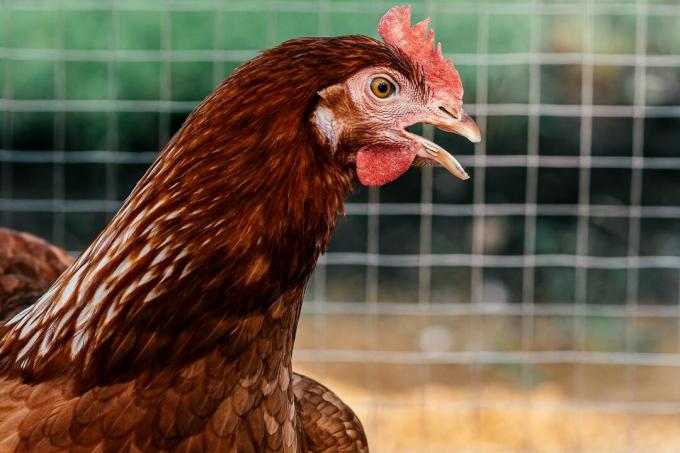

Table of contents
- heat
- Dust
- infectious diseases
- parasite infestation
- Foreign body swallowed
- frequently asked Questions
When a chicken rattles and gasps for air, there can be serious reasons. Therefore, you should not simply wait and see, but act directly. Find out more about possible causes and the right reaction here.
heat
Chickens are very sensitive to heat. If they are exposed to high temperatures, they quickly suffer from heat stress, as a result of which they as a species usually begin to pant noiselessly, but this can also be accompanied by a faint rattle can. This reaction serves to expel warm air and hope to be able to breathe cooler air back into the body. In addition to abnormal breathing, other features may indicate overheating:
- Wings are spread and hang down
- decreased appetite
- increased desire to drink
- seem sluggish and exhausted
- lesser laying performance
- Eggs with remarkably thin shells
Act right

A chicken that is wheezing and gasping for air should be moved immediately to a shady, cooler location. A place with ventilation is ideal. An outdoor fan can be helpful when there is no wind. It is important to provide enough water. Heat stressed chickens usually recover relatively quickly. As a preventive measure, you should always ensure that there is sufficient shade in the enclosure in summer, but also when choosing the location of the chicken coop.
Dust
If chickens spend a lot of time in a dusty environment, rattling and gasping for air is not uncommon. Dust dries out the upper airways, which can cause irritation and cause breathing problems.
Act right
In this case, the affected chicken must be moved immediately to a protected, dust-free area. Higher humidity is optimal, for which fresh water is also made available. The best measure, however, is prevention by avoiding dusty locations.
infectious diseases

If a chicken rattles or gasps for air, it is often an infectious disease. In the case of poultry, these include B. Bronchitis, bacterial mycoplasmosis, larynx tracheitis, chicken flu and the highly contagious viral avian influenza/bird flu. Next to shortness of breath Other symptoms may occur depending on the type of disease:
| Illness | symptoms |
|---|---|
| generally | Fatigue, loss of appetite, drowsiness, depending on the severity of the infection, yellow or bloody sputum possible |
| mycoplasmosis | Runny nose, discharge from the eyes and nose, swelling of the head |
| Inflammation of the larynx and trachea | Runny nose, facial swelling, beak breathing, (bloody) nasal discharge |
| chicken sniffles | runny nose, sometimes swollen facial areas |
| bird flu | decline in egg production, thin or missing egg shells, swelling of the head, neck, crest or wattles, uncoordinated gait, unusual head position, watery, mucous diarrhea, apathetic and lethargic Behave |
Act right
To date, there is no specific treatment option for viral infectious bronchitis and laryngeal tracheitis in chickens. In the case of bronchitis, the focus is only on preventing secondary infections and providing pain-relieving treatment. The latter is also aimed at in the case of laryngeal tracheitis, although the chance of survival of infected animals is low.
In the case of bacterial bronchitis and mycoplasmosis, antibiotics are usually administered, with which the disease can be cured well. We recommend a visit to the veterinarian.
When chicken flu, you should place the sick chicken under a heat lamp. With a diet rich in vitamins, you can also preventively strengthen the immune system of your chickens. You can also resort to home remedies if the animals have breathing problems due to a cold:
- Steam bath with hot chamomile broth
- Mix the grated onions into the feed
- Administer bronchial/respiratory herbs (eg. B. thyme, plantain)
If you suspect bird flu, inform the veterinarian or the responsible veterinary service immediately. There is an obligation to report! Affected animals must be isolated immediately. Killing is unavoidable, which usually affects the entire flock of chickens.
With all infectious diseases, thorough disinfection of the whereabouts of the diseased chicken is necessary.

Tip:
Good hygiene in henhouses and on outdoor areas reduces the risk of any kind of infection. Ask the veterinarian or the veterinary office how and with what this can be achieved.
parasite infestation
Chickens are often infected by the dreaded trachea or lung worms and by mites and lice, which enter the body via the respiratory tract. There they trigger an automatic reflex in the animals to get rid of them. Similar to a "frog in the throat", the affected chicken rattles and clears its throat.
If there is an extensive infestation in the respiratory tract, there may also be shortness of breath, so that the chickens gasp for air. In addition, parasites can injure the mucous membranes, which can lead to inflammation. Swelling and pain make breathing difficult, and panting and gasping are typical symptoms. Coughing, sneezing and discharge from the eyes and nose can also occur with trachea/lungworms.
Act right
- Check chicken for parasites on and between feathers
- Check the mouth and throat area for parasites, redness and swelling
- depending on the parasite species:
- Apply diatomaceous earth directly to body against mites
- powder with lice powder
- Administer wormer in case of worm infestation (worms are mainly in the gastrointestinal tract)
- Concurat-L 10% recommended for trachea and lung worms
- Use contact insecticides to control fleas
- disinfect entire area with insecticide
- consult a veterinarian in severe cases
A notice:
Mites, fleas and lice cannot live long inside the body. External control is therefore a priority so that no further parasites can get into the respiratory tract.
Foreign body swallowed

It occasionally happens that foreign bodies get into the throat when pecking. If breathing is disturbed as a result, the chicken gasps. If the foreign body narrows the trachea, chickens gasp for air.
Act right
- Examine or feel the throat and throat area for foreign bodies
- remove foreign objects if possible
- if removal is not possible, consult a veterinarian as soon as possible
- after removing it yourself, pay attention to any swelling or bleeding from injuries and consult a veterinarian if necessary
frequently asked Questions
No chicken dies from the rattle alone, but possibly from the underlying cause. Heat stress, infections and foreign bodies in the throat or trachea can lead to life-threatening situations if countermeasures are not taken quickly.
No. As with us humans, the food can also get stuck “across” or a chicken can choke. It only becomes serious if it doesn't stop by itself after a few minutes. Therefore, if there are any abnormalities, the affected chicken should be observed closely, ideally several times throughout the day, in order to be able to take action if necessary.
 Mirko
Mirko
Learn more about pets

Common chicken diseases with symptoms + pictures
Chickens are low-maintenance animals, but they are not immune to diseases. Parasites, viruses or bacteria can cause them problems and serious illnesses are even notifiable. Here you will find the most common chicken diseases with symptoms and pictures at a glance.

Chicken twists its head: what does that mean?
When chickens suddenly tilt their heads, there is usually a serious reason behind it. Here you can find out what can be responsible and what action should be taken if a chicken turns its head.

Chicken tilts to the side: balance disorder?
Keeping chickens in your own garden is becoming increasingly popular. All you need is enough exercise and a winter-proof stable. Unfortunately, chickens are not the most robust creatures. For example, if a chicken repeatedly falls to the side, it can be due to an imbalance, but it can also be worse.

Bird Names: 348 Popular Budgie Names
If you have budgies as pets or are planning to get two parakeets, the exciting task ahead of you is naming them appropriately. In this text you will be presented with various budgie names to help you choose of a name that suits both your feathered friend and your personal taste fits.

441 guinea pig names from cute to funny
A suitable guinea pig name can not only be a fun or cute addition, but also a way to create a special bond with your little furry friend.

Turtle Names: 473 Names for Turtles
Finding an appropriate name for your turtle can be a fun and meaningful task. A well-chosen turtle name can underline your friend's personality and uniqueness and create a special bond between the two of you. Whether you're looking for male, female, or gender-neutral names, you'll find a wide range of names for your […]



